Augustine in Algeria
Conference
---- Site Visits
----
Travelers' Tales
----
Security Situation
Conference: 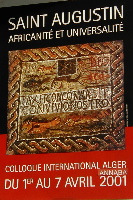 The formal proceedings
of the conference stretched over three days in Algiers and were concluded
with a session in Annaba. The format was the familiar academic one:
two or three papers, response/questions, and a coffee break; repeat till
dark; repeat whole pattern again the next day. This was complicated
by the unusual multilingual features of this particular program - almost
none of the European or American scholars were comfortable in all three
languages (French, Arabic, English) of the conference, and it was ironically
and pleasingly most likely to be non-academic Algerians who would need
the least translation. But the simultaneous translation facilities
provided were very effective and made it possible to follow all the proceedings
in your language of choice. (The several papers delivered in Annaba were
entirely in French, with no simultaneous translation provided.) As
each paper concluded, staffers fanned through the audience distributing
printed copies of the text to all who wished them. We are assured
that the proceedings will be published in the near future.
The formal proceedings
of the conference stretched over three days in Algiers and were concluded
with a session in Annaba. The format was the familiar academic one:
two or three papers, response/questions, and a coffee break; repeat till
dark; repeat whole pattern again the next day. This was complicated
by the unusual multilingual features of this particular program - almost
none of the European or American scholars were comfortable in all three
languages (French, Arabic, English) of the conference, and it was ironically
and pleasingly most likely to be non-academic Algerians who would need
the least translation. But the simultaneous translation facilities
provided were very effective and made it possible to follow all the proceedings
in your language of choice. (The several papers delivered in Annaba were
entirely in French, with no simultaneous translation provided.) As
each paper concluded, staffers fanned through the audience distributing
printed copies of the text to all who wished them. We are assured
that the proceedings will be published in the near future. Images of participants in the
conference.
I attach a copy
of the program's papers, accurate to the best of my recollection as
a picture of what was actually delivered. I will comment here on
only a couple of the more striking interventions, and on the tenor of the
whole.
The themes of "Africanité" and "Universalité"
were clearly chosen with a view to the larger Algerian audience in mind,
and the visitors from abroad were clearly surprised to find such a large,
engaged, and interesting community of Algerian participants. The
themes and the audience, moreover, gave an unaccustomed urgency and flavor
to the proceedings as a whole. This was not without its tensions.
Thus sessions typically ran a little longer than
scheduled; panelists were called back to the stage to respond to questions;
conference participants came to the aisle microphones to ask questions
-- but there was often a disconnect between the concerns coming from the
floor (usually not from professional academics of the sort who had given
the papers) and the responses that could be or were given, and often questions
went unaddressed as time was made to give as many voices from the floor
a chance to be heard as could be squeezed in. Several individuals
from the general audience made striking impressions: a retired schoolteacher,
whose career must have begun under the French but extended mainly after
independence, spoke for restoring Latin to the curriculum "so we may read
the stones around us". 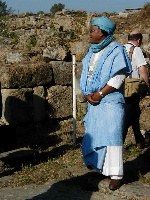 A
berobed philosopher from southern Algeria asked incisive questions and
spoke articulately for an understanding of Augustine that bridged cultural
gaps. Several times the distinguished and learned visitors were challenged
to think, or point to scholarship that had thought, through the comparisons
between ancient Christian thought and medieval Islamic discourse, and were
rightly disappointed by the thinness of the answers - so thin has been
western engagement and such the configuration of traditional Augustinian
studies. It is fair to hope both that Algerian participants in the
conference were inspired with a renewed interest in a great philosopher,
but also that the scholars present went away with a different sense of
the contexts in which their studies can have meaning today.
A
berobed philosopher from southern Algeria asked incisive questions and
spoke articulately for an understanding of Augustine that bridged cultural
gaps. Several times the distinguished and learned visitors were challenged
to think, or point to scholarship that had thought, through the comparisons
between ancient Christian thought and medieval Islamic discourse, and were
rightly disappointed by the thinness of the answers - so thin has been
western engagement and such the configuration of traditional Augustinian
studies. It is fair to hope both that Algerian participants in the
conference were inspired with a renewed interest in a great philosopher,
but also that the scholars present went away with a different sense of
the contexts in which their studies can have meaning today.
The contributions ranged from the philological
and historical to the philosophical and theological. The former included
some quite interesting pieces that may have passed by much of the audience:
Konrad Vössing on late antique schools, Yoshichika Miyatani on the
surprisingly deep roots of the single word "magnus" ("great") with which
the Confessions open, and the like. 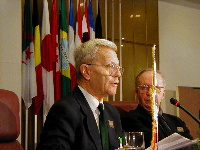 Robert
Markus captured the attention of the scholars while making a point of considerable
relevance to the wider audience by making more explicit the growing scholarly
consensus (building on Markus's own work of many years) that Augustine's
"Catholicism" was not somehow the authentic and natural form of religion
against which the "Donatists" stood in schism, but rather that he represented
a dissident view himself. Markus suggested that the contested question
of rebaptism (whether it would be permitted to rebaptise those who had
lapsed in time of persecution) was not aboriginal to the contested episcopal
election of 312 that gave rise to the schism, but was rather an issue that
was introduced in response to pressure from bishops outside Africa when
the two sides went looking for support from abroad. If this is true
(as I believe it is), then it repositions Augustine's "universal" catholicism
as a particular kind of creation arising from and in response to a particular
kind of African heritage. At the other end of a long historical sweep,
Abdelhadi Ben Mansour delivered a fascinating paper on the memory of Augustine
in the Maghreb in the sixteenth and seventeenth centuries - a time
when memory could be full
of inaccuracies and passion. Travelers then brought back tales of the
crypt in Tagaste where Muslims and Christians alike kept lamps burning and
prayed to Augustine for health and welfare, and in "Tagaost", in Morocco,
an Augustinian monk who had come there from the Canary Islands was
venerated and sometimes confused with Augustine himself. (Similar
syncretisms persist: see J.S. Griffith, Beliefs and Holy Places
[Tucson 1992] for very similar stories, conflating Francis of Assisi,
Francis Xavier, and a local missionary Franciscan in northern Mexico.)
Robert
Markus captured the attention of the scholars while making a point of considerable
relevance to the wider audience by making more explicit the growing scholarly
consensus (building on Markus's own work of many years) that Augustine's
"Catholicism" was not somehow the authentic and natural form of religion
against which the "Donatists" stood in schism, but rather that he represented
a dissident view himself. Markus suggested that the contested question
of rebaptism (whether it would be permitted to rebaptise those who had
lapsed in time of persecution) was not aboriginal to the contested episcopal
election of 312 that gave rise to the schism, but was rather an issue that
was introduced in response to pressure from bishops outside Africa when
the two sides went looking for support from abroad. If this is true
(as I believe it is), then it repositions Augustine's "universal" catholicism
as a particular kind of creation arising from and in response to a particular
kind of African heritage. At the other end of a long historical sweep,
Abdelhadi Ben Mansour delivered a fascinating paper on the memory of Augustine
in the Maghreb in the sixteenth and seventeenth centuries - a time
when memory could be full
of inaccuracies and passion. Travelers then brought back tales of the
crypt in Tagaste where Muslims and Christians alike kept lamps burning and
prayed to Augustine for health and welfare, and in "Tagaost", in Morocco,
an Augustinian monk who had come there from the Canary Islands was
venerated and sometimes confused with Augustine himself. (Similar
syncretisms persist: see J.S. Griffith, Beliefs and Holy Places
[Tucson 1992] for very similar stories, conflating Francis of Assisi,
Francis Xavier, and a local missionary Franciscan in northern Mexico.)
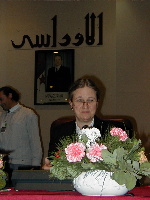 At
At
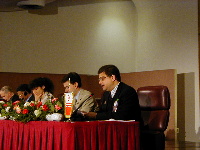 the
crossroads of scholarship and more contemporary
concerns fell, for example, several interesting and important papers on
the state of research regarding "Donatism", including one by André
Mandouze, followed by Maureen
A. Tilley and Alfred Schindler. Dorothea Weber astutely traced the
anti-African bias in the anti-Augustinian polemics of Julian of Eclanum.
More
theological presentations also had an undeniable ring of currency, ranging
from Robert Dodaro's piece on the pastoral implications of speaking of
the secular city and the City of God to the remarks a short while later
of the Roman Catholic archbishop of Algiers, Henri Teissier, on a similar
theme.
the
crossroads of scholarship and more contemporary
concerns fell, for example, several interesting and important papers on
the state of research regarding "Donatism", including one by André
Mandouze, followed by Maureen
A. Tilley and Alfred Schindler. Dorothea Weber astutely traced the
anti-African bias in the anti-Augustinian polemics of Julian of Eclanum.
More
theological presentations also had an undeniable ring of currency, ranging
from Robert Dodaro's piece on the pastoral implications of speaking of
the secular city and the City of God to the remarks a short while later
of the Roman Catholic archbishop of Algiers, Henri Teissier, on a similar
theme.
The star of the show, undoubtedly, was the 84
year old André Mandouze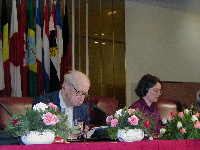 ,
a towering figure in Augustinian studies for the last half century.
His initial and pathbreaking article on Augustinian mysticism was delivered
at the great "Augustinus Magister" conference in Paris in 1954 (on the
occasion of the 1600th anniversary of Augustine's birth), and his two landmark
books of 1968 (Saint Augustin: l'aventure de la raison et de la
grace)
and 1984 (Prosopographie Chretienne du Bas-Empire embracing African
Christianity
from 303-533 CE: now followed by the two large volumes brought to
light by the late Charles Pietri covering Italian Christianity from 313-604)
have been indispensable tools for a generation. But Mandouze was
also an engaged French intellectual of his time and made a quite different
reputation in the 1950s as a supporter of Algerian independence.
He had taught there as a young man, laying foundations for his scholarly
as well as political engagement, and was a tireless campaigner for what
he saw as a just cause. At one point he was jailed for his activities.
Then he served as first rector of the independent university of Algiers.
The Algerian audience included many former colleagues and students, and
many others are well placed in Algerian society and government.
,
a towering figure in Augustinian studies for the last half century.
His initial and pathbreaking article on Augustinian mysticism was delivered
at the great "Augustinus Magister" conference in Paris in 1954 (on the
occasion of the 1600th anniversary of Augustine's birth), and his two landmark
books of 1968 (Saint Augustin: l'aventure de la raison et de la
grace)
and 1984 (Prosopographie Chretienne du Bas-Empire embracing African
Christianity
from 303-533 CE: now followed by the two large volumes brought to
light by the late Charles Pietri covering Italian Christianity from 313-604)
have been indispensable tools for a generation. But Mandouze was
also an engaged French intellectual of his time and made a quite different
reputation in the 1950s as a supporter of Algerian independence.
He had taught there as a young man, laying foundations for his scholarly
as well as political engagement, and was a tireless campaigner for what
he saw as a just cause. At one point he was jailed for his activities.
Then he served as first rector of the independent university of Algiers.
The Algerian audience included many former colleagues and students, and
many others are well placed in Algerian society and government.
Now, almost forty years after independence, he
is thus a figure accorded great veneration in Algeria, and it is his personality
and breadth of vision that embodied the aims of the conference: he
is no less "Augustinian" for being open to and deeply committed to supporting
Algerian - that is to say, Islamic - autonomy. His remarks at the
conclusion of the formal sessions in Algiers were concise and clear.
He spoke of resisting all forms of religious integralism, an old rubric
under which he clearly sees at least some of current Roman policy sailing.
(The Pope's leading theologian and enforcer of orthodox, Cardinal Josef
Ratzinger, began his career with significant scholarly work on Augustine
himself, and Mandouze clearly had Ratzinger in mind in his remarks.)
He evoked his own teacher and mentor Henri Marrou for their lifelong struggle
to oppose Augustinisms in favor of Augustine himself. For a
figure who has been accorded as much reverence as Augustine, such
subversion of ideology
is an ever-difficult and challenging task, so much is the weight that later
generations have hung on his shoulders, but it is clear that the best work
of our time on Augustine always contains a strong strain of this movement
to liberate him from his reputation and know him for himself.
After the visit to Annaba and other sites, Mandouze
closed the whole conference (I owe this report to Professor Patout Burns)
with a lecture in French in a public lecture hall in the city of Algiers.
In splendid Gallic rhetoric he reviewed the interaction of Europeans and
Algerians in the appropriation of the work of Augustine and the contribution
of European Christians, in particular, to the establishment of the Popular
and Democratic Republic of Algeria, with its universities and archeological
parks. The lecture was attended by many who had not participated
in other parts of the Conference.
The final conference session in Annaba, held in
what appeared to be more or less the city council chambers of the city,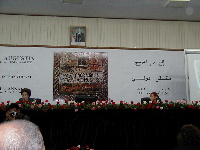 was devoted to a description of the state of play at the chief Augustinian
sites of Hippo (well excavated long ago, more to be done) and Tagaste (overbuilt,
neglected, and frustrating) -- the later an impassioned presentation by
a local scholar, Mme. Nacera Benseddik. That session was closed with
broader reflections by Prof. Otto Wermelinger (who was one of the most
active organizers of the whole conference) and the acting president of
the Haut Conseil Islamique, M. Bou Ayad.
was devoted to a description of the state of play at the chief Augustinian
sites of Hippo (well excavated long ago, more to be done) and Tagaste (overbuilt,
neglected, and frustrating) -- the later an impassioned presentation by
a local scholar, Mme. Nacera Benseddik. That session was closed with
broader reflections by Prof. Otto Wermelinger (who was one of the most
active organizers of the whole conference) and the acting president of
the Haut Conseil Islamique, M. Bou Ayad.
It would be impossible for me to say what any
Algerian participant in the conference might have taken away from it.
Hopes were expressed on all sides that this would be the first encounter
of a series, and there was a fair amount of hallway discussion about what
subsequent meetings might look like. Most discussion focused on increasing
the attention to the material past, not least because that is something
we already know how to do and that could be done in Algeria with evident
profit. If such attention led eventually to renewed archaeological
activity, we could indeed come away with real enhancement to our knowledge.
At the same time, the frustrating fits and starts
of conversation across the Islamic/Christian, Algerian/European cultural
divides were tantalizing: it is less clear how one would carry discussion
forward in that vein, but it is clearly desirable that it be done.
It would be good to get beyond the slightly stilted ideological framework
that was necessary for this meeting (every paper needed be thought into
the context of those abstractions 'Africanité' and 'Universalité'
and papers wound up being inclined to aggrandize rather than criticize:
yes, of course, Augustine was African, but yes, of course, his meaning
was Universal. Having proven that voices can be heard across barriers,
it would be refreshing to begin admitting that gaps exist, that "African"
and "Universal" are ambiguous terms at best, carrying a lot of ideological
freight in all periods, and that Augustine can help us understand ourselves
not only when we think we see him most like ourselves, but also (or even
especially) when we see the distance that separates us from him. The past
is heritage, but it is also challenge: challenge to recognize just
how self-made cultures are, how little claim they often have to real inheritance,
and how heritage can be an excuse for not addressing contemporary urgent
concerns. In Hollywood terms, that kind of argument is "low concept",
and it was surely necessary to begin this adventure with a more traditional
and "high concept" approach. To consider the possibilities now is
exciting, and they are possibilities only because this remarkable venture
came off so successfully.
Conference
----
Site
Visits ----
Travelers'
Tales ---- Security
Situation
 The formal proceedings
of the conference stretched over three days in Algiers and were concluded
with a session in Annaba. The format was the familiar academic one:
two or three papers, response/questions, and a coffee break; repeat till
dark; repeat whole pattern again the next day. This was complicated
by the unusual multilingual features of this particular program - almost
none of the European or American scholars were comfortable in all three
languages (French, Arabic, English) of the conference, and it was ironically
and pleasingly most likely to be non-academic Algerians who would need
the least translation. But the simultaneous translation facilities
provided were very effective and made it possible to follow all the proceedings
in your language of choice. (The several papers delivered in Annaba were
entirely in French, with no simultaneous translation provided.) As
each paper concluded, staffers fanned through the audience distributing
printed copies of the text to all who wished them. We are assured
that the proceedings will be published in the near future.
The formal proceedings
of the conference stretched over three days in Algiers and were concluded
with a session in Annaba. The format was the familiar academic one:
two or three papers, response/questions, and a coffee break; repeat till
dark; repeat whole pattern again the next day. This was complicated
by the unusual multilingual features of this particular program - almost
none of the European or American scholars were comfortable in all three
languages (French, Arabic, English) of the conference, and it was ironically
and pleasingly most likely to be non-academic Algerians who would need
the least translation. But the simultaneous translation facilities
provided were very effective and made it possible to follow all the proceedings
in your language of choice. (The several papers delivered in Annaba were
entirely in French, with no simultaneous translation provided.) As
each paper concluded, staffers fanned through the audience distributing
printed copies of the text to all who wished them. We are assured
that the proceedings will be published in the near future. 




